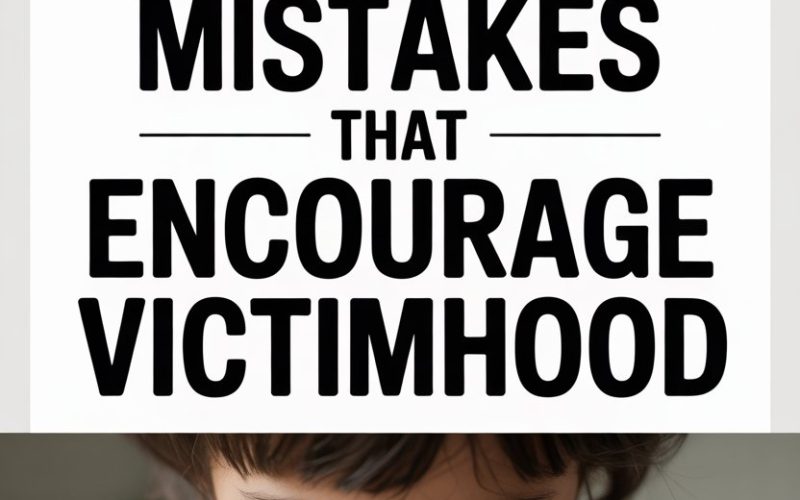Ever had a day where you find yourself refereeing sibling squabbles, negotiating over broccoli, and playing therapist—all before breakfast?
Welcome to parenthood, where every morning feels like a new episode of “Survivor: Family Edition.” Amid the chaos, we’re all just trying to raise resilient, happy kids.
Still, certain well-meaning habits can send our little ones straight down the path of victimhood—where everything happens to them, and responsibility is something other people have.
Time to peek at a few sneaky parenting pitfalls that, left unchecked, can keep kids stuck in that “woe is me” rut.
1. Taking Over Every Problem
Few things tug harder at the heartstrings than a teary child lamenting a playground injustice or a botched craft project.
Next thing you know, you’re halfway through typing a strongly-worded email to the teacher or finishing the papier-mâché volcano yourself.
But here’s the catch: stepping in at every wobble teaches kids that discomfort is unbearable and only adults have the power (and obligation) to fix it.
According to research published by the American Psychological Association, children who are “rescued” too often have lower confidence in their ability to solve problems as they grow.
Think of yourself as a coach, not a fixer. Instead of leapfrogging in to solve the problem, try saying, “That sounds tough. What do you think you could do?”
You might get a blank stare or some wild suggestions (building a time machine to redo the day isn’t entirely outside the realm of kid logic). Still, the point is to give them ownership.
Sure, you’ll need to gauge when stepping in is genuinely necessary—if your child’s safety is at risk, don your superhero cape. Otherwise, let them experience discomfort.
Falling out with a friend, forgetting a lunchbox, losing at Monopoly: these are the sandpaper moments that polish life skills.
Lest you worry this is cold-hearted, remember: the world won’t always rush to cushion their falls.
Better to learn about disappointment and perseverance with you as the safety net than for the first time at age 23, staring slack-jawed at their first boss.
2. Blaming Others as a Family Sport
Ever heard this one from your child: “It’s not my fault!” Of course you have. Kids are natural-born scapegoat-seekers. The trouble starts when parents inadvertently join the blame parade.
Someone else’s fault becomes the family motto: “The test was unfair,” “The coach is picking favourites,” “Your brother distracted you.”
It’s easy to slip into this pattern, especially when your child is hurting. Who doesn’t want to defend their baby from life’s unfairness?
Still, research shared by Dr. Michele Borba, author of Unselfie, shows that children who regularly hear external excuses for their struggles tend to see themselves as powerless, and less likely to develop grit.
Next time your child comes home with a tale of injustice, try a different tack: “That sounds frustrating. Is there anything you could do differently next time?” Or even, “What part of this was in your control?”
It’s not about ignoring real issues—sometimes teachers do make mistakes, and life is unfair—but about showing your child they have agency.
If you catch yourself finger-pointing, pause and reframe. “That was a tough test. Maybe we can practise those maths problems together.”
This subtle shift teaches your child to focus on action and adaptation, not just blame allocation.
Keep in mind: you’re not raising a defence attorney, you’re raising a problem-solver.
3. Showering Comfort and Labels Instead of Encouragement
After a rough day, it’s so tempting to scoop your child up, tell them how special they are, and promise that the world just doesn’t appreciate their unique brilliance.
You might even toss in a “You’re just not a math person,” or “Some kids are mean because they’re jealous of you.” This feels comforting, but it can quietly cement a victim identity.
Stanford psychologist Carol Dweck’s research on growth mindset highlights the long-term impact of how we respond to our children’s setbacks.
Praising effort and strategy (“You worked really hard on that!”) helps kids bounce back, while comforting with fixed labels (“You’re just not sporty”) encourages them to believe they’re powerless to change.
Next time disappointment strikes, resist the urge to hand out labels or wallow in sympathy.
Instead, offer empathy and encouragement: “I can see you’re upset. Want to talk about what went wrong? I know you can figure out a way forward.” Then—crucially—step back. Give them time to process and respond.
If your child’s self-pity persists, try gently challenging the story: “Do you really think you’ll never score a goal, or was today just a rough match?”
Help them spot times they’ve rebounded before.
Kids are emotional creatures prone to drama. (Let’s be honest, so are adults. Ever stubbed your toe on a Lego?)
Still, over-comforting or slotting children into tidy personality boxes teaches them that suffering is their main story, not just one chapter.
Turning “Why Me?” Into “What Now?”
Raising children with resilience isn’t about hardening their hearts or expecting them to tough out every challenge alone. It’s about showing them they can feel pain, frustration, and disappointment—and still have choices.
No parent gets it right all the time. (If you do, please set up a hotline for the rest of us mortals.)
Small shifts in how we react—offering a listening ear, asking what they might try next, resisting the urge to helicopter—can help our kids trade the script of victimhood for one of agency.
Tonight, when the next drama unfolds, pause. Take a breath. Ask a question.
Let them wrestle with discomfort, with you in their corner.
They might just surprise you—right after they finish complaining about dinner.




